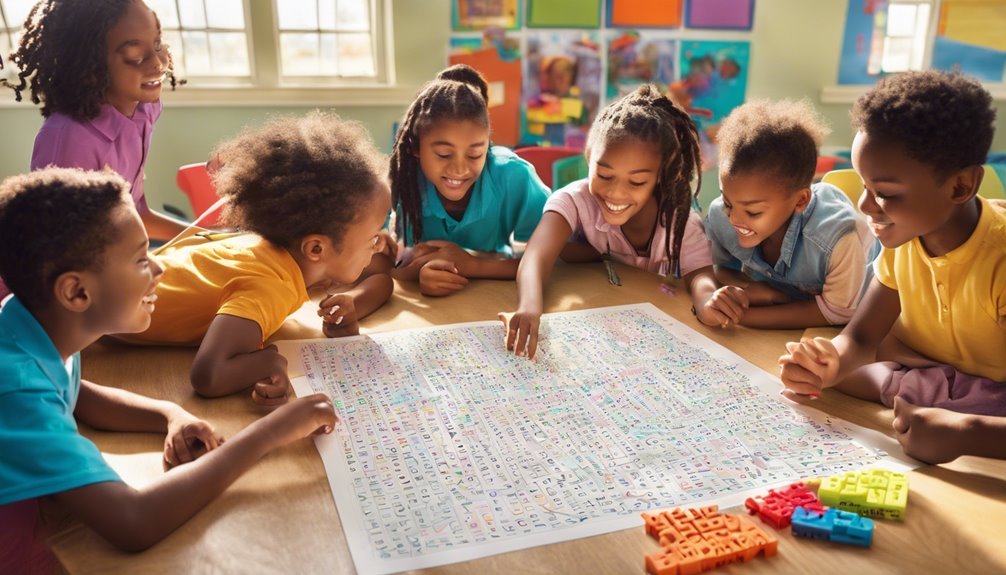How Word Search Puzzles Boost Critical Thinking in Young Learners
Like a treasure map guiding young explorers, word search puzzles open doors to critical thinking development. As children navigate through letters, they're not just playing; they're honing vital analytical skills. This engaging activity prompts them to evaluate patterns and devise strategies, encouraging a mindset of inquiry. What benefits lie beneath the surface of this seemingly simple pastime? Understanding this connection can reshape how you view learning and cognitive growth in young minds.
Key Takeaways
- Word search puzzles require students to analyze letter patterns, enhancing their ability to discern information critically.
- Engaging in puzzles promotes discussions and strategies, fostering a mindset of inquiry and evaluation among young learners.
- Searching for hidden words improves visual recognition and cognitive development, essential for effective problem-solving.
- Repeated encounters with vocabulary in puzzles boost language skills and deepen understanding, encouraging critical thinking about language use.
- The challenge of locating words cultivates flexibility in thought, allowing students to adapt their strategies based on puzzle complexity.
The Importance of Critical Thinking in Education
Critical thinking is an essential skill in education that empowers students to analyze information, make informed decisions, and solve complex problems.
The importance of reasoning in this process can't be overstated; it allows you to evaluate arguments critically and discern biases.
By honing your analytical skills, you enhance your ability to synthesize information across various subjects, leading to deeper understanding and retention.
This skill set is crucial not only in academic settings but also in real-world scenarios where you'll confront multifaceted challenges.
Engaging in activities that promote critical thinking, such as discussions, debates, and puzzles, fosters a mindset of inquiry and evaluation.
Ultimately, mastering critical thinking equips you with the tools to navigate an increasingly complex world effectively.
How Word Search Puzzles Work
Word search puzzles are a fascinating blend of challenge and entertainment, engaging your brain in a unique way. Understanding the word search mechanics is crucial to mastering these puzzles. Each puzzle consists of a grid filled with letters, where words are hidden in various directions.
As you navigate the grid, the puzzle difficulty increases with the length and complexity of the words. You'll develop strategies to identify potential word placements, enhancing your cognitive skills. By focusing on letter patterns and eliminating distractions, you sharpen your critical thinking abilities.
The very act of seeking out words encourages you to think analytically, improving both your concentration and problem-solving skills, essential components of effective learning.
Enhancing Pattern Recognition Skills

While you search for hidden words in a puzzle, you naturally enhance your pattern recognition skills. This process is critical for visual recognition, as it trains your brain to identify familiar shapes and sequences. Enhanced pattern recognition directly contributes to cognitive development, allowing you to process information more effectively.
| Visual Recognition Skills | Cognitive Development Benefits |
|---|---|
| Identifying letter patterns | Improved problem-solving abilities |
| Recognizing word shapes | Increased memory retention |
| Spotting directional cues | Enhanced critical thinking |
Engaging in word search puzzles offers a fun way to strengthen these essential skills. As you tackle each puzzle, you're not just having fun; you're also sharpening your mind for future challenges. Embrace the journey of learning through play!
Encouraging Problem-Solving Strategies
Engaging with word search puzzles not only sharpens your pattern recognition but also fosters effective problem-solving strategies. As you navigate through the grid, you'll enhance your analytical skills, learning to approach challenges systematically.
Each puzzle encourages you to devise creative thinking methods, as you brainstorm different ways to locate words and make connections. This process cultivates flexibility in thought, allowing you to adapt your strategies based on the puzzle's complexity.
Research indicates that engaging in such activities promotes cognitive resilience, enabling you to tackle problems with confidence. By consistently challenging yourself with word searches, you're not only having fun but also honing the critical thinking skills essential for academic and life success.
Embrace this unique approach to problem-solving!
Boosting Vocabulary and Language Skills

There's something about word search puzzles that naturally enhances your vocabulary and language skills. As you search for hidden words, you're actively engaging with a range of terms, which leads to vocabulary expansion.
Each puzzle challenges you to recognize and recall words, enriching your language comprehension. Research shows that this interactive approach stimulates cognitive processes, making it easier to retain new vocabulary.
By repeatedly encountering words in different contexts, you not only memorize their meanings but also understand their applications. This method encourages you to think critically about language, leading to deeper insights and improved communication skills.
Integrating Word Search Puzzles Into Learning Routines
Integrating word search puzzles into your learning routine can significantly enhance the educational experience. By incorporating these puzzles as a regular activity, you stimulate critical thinking and reinforce vocabulary retention.
Research shows that engaging with word searches not only improves pattern recognition but also enhances cognitive flexibility—essential components of effective learning strategies. Set aside a few minutes daily for a targeted word search that aligns with your current subjects; this can deepen your understanding and retention of new concepts.
Additionally, you can collaborate with peers to create themed puzzles, fostering a sense of community and shared learning. Ultimately, consistent use of word search puzzles can transform mundane study sessions into dynamic opportunities for intellectual growth.
Frequently Asked Questions
Can Word Search Puzzles Be Used for Older Students Too?
Absolutely, word search puzzles can be beneficial for older students too. They enhance cognitive skills like pattern recognition and attention to detail, which are crucial in advanced learning.
By integrating these puzzles into your curriculum, you'll likely see increased engagement levels among students. They provide a fun, challenging way to reinforce vocabulary and subject knowledge, making learning enjoyable while sharpening critical thinking abilities.
What Age Group Benefits Most From Word Search Puzzles?
When considering which age group benefits most from word search puzzles, it's essential to look at cognitive development and age appropriateness.
Generally, younger learners, around ages 5 to 10, experience significant gains in vocabulary and pattern recognition skills.
However, older students can still find value in these puzzles as they enhance critical thinking and problem-solving abilities.
Ultimately, tailoring the complexity of the puzzles to the age group ensures maximum engagement and cognitive benefit.
Are There Any Downsides to Using Word Search Puzzles?
While word search puzzles can be enjoyable, they do have downsides. You might experience cognitive overload if you tackle overly complex puzzles, leading to frustration rather than fun.
Additionally, relying solely on these activities can limit vocabulary expansion, as they often focus on recognition rather than comprehension. To truly enhance your skills, balance word searches with other learning methods that promote deeper understanding and broader language use.
How Long Should a Typical Word Search Session Last?
Imagine you're battling a dragon in a video game, and you need to strategize quickly!
For a word search session, aim for about 15 to 30 minutes. This duration optimizes focus retention without leading to fatigue.
Research shows that shorter sessions enhance concentration and enjoyment, allowing you to engage with the puzzle effectively.
You'll find that maintaining your mental sharpness is crucial for mastering both the puzzle and your critical thinking skills!
Can Word Search Puzzles Replace Traditional Teaching Methods?
While word search puzzles can enhance learning, they shouldn't completely replace traditional teaching methods.
Their effectiveness lies in boosting teaching engagement and providing an interactive way to reinforce vocabulary. However, they lack the depth and critical thinking opportunities found in conventional approaches.
To truly master a subject, you need a blend of diverse techniques that challenge your cognitive skills while ensuring comprehensive understanding and retention.
Balance is key in effective education.
Conclusion
Incorporating word search puzzles into learning routines can be as transformative as planting seeds in fertile soil; with time and practice, critical thinking skills flourish. By engaging with these puzzles, young learners sharpen their analytical abilities and enhance their vocabulary, laying a strong foundation for future academic success. As you introduce these activities, you'll not only entertain but also empower children to think critically, adapt their strategies, and embrace challenges, ultimately nurturing a lifelong love for learning.





